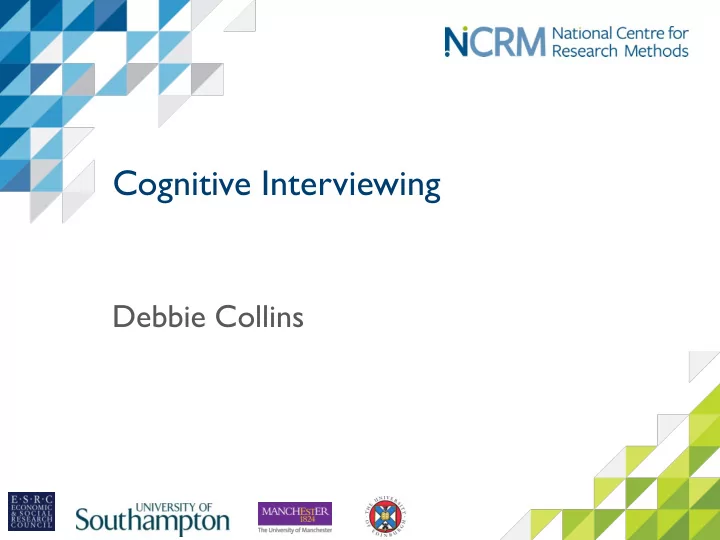

Cognitive Interviewing Debbie Collins
What is cognitive interviewing?
Cognitive interviewing techniques • Think aloud • Probing • Observation • Response latency • Vignettes/ card sorts
Cognitive Interviewing Process Comprehension Recall Verbal Ask survey Judgment probing Q Response Participant Interviewer ‘thinks observation aloud’
Think aloud
Training respondents to think aloud • Explain format of the interview – Interviewer will ask a survey question/ ask respondent to attempt to fill in a questionnaire – Respondent is asked to verbalise thought processes • Practice thinking aloud – Interviewer demonstrates – Respondent has a go
Windows example • ADD ANIMATION
How many windows are there in your home? As you count the windows, tell me what you are thinking
Think aloud ▪ Uses non-directive, open probing: ➢ ‘tell me more about what you’re thinking’ ➢ ‘keep talking’ ➢ ‘can you say more about that’
Probing
Verbal probing ▪ Uses directive, open questions ▪ what does the term X mean to you?’ ▪ ‘why did you choose that answer?’ ▪ ‘how did you remember that?’ ▪ ‘can you tell me, in your own words, what that question is asking?’ ▪ ‘Concurrent’ or ‘retrospective’
Concurrent and retrospective probing • What do you think are the pros and cons?
Example of probing Test survey Q In the last two weeks, how many days have you spent outside?
Example of probing Example probes • How did you go about answering this question? • What did you understand by the term outside when answering this question?
Practical issues
Recording
Number of questions to test • Cognitive interview is usually no more than 1 hour • Need to allow time for – Introduction – Asking test survey questions – Think aloud – Probing • May only be able to test 15-20 survey questions
Number of test participants
Section header goes here
Recommend
More recommend